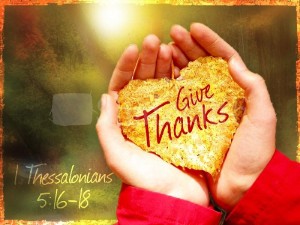I truly love this time of year – it is in fact “the most wonderful time of the year.” Wait, wait it is not time for Christmas songs just yet! Anyway, I do love this time of giving thanks for all the blessings in our lives and yes, we all have blessings to be thankful for.
In the 12th chapter of the Gospel of St. Luke there is a story of a rich man whose land “brought forth plentifully” and he ran out of space to store all that he had. So he thought about it and decided he needed to build a larger barn to store all that he had. When he completed its construction he stepped back and said to his soul, “Soul, you have ample goods laid up for many years; take your ease, eat, drink, be merry.”
Now at first glance this sounds like a good story and the man is wise for storing things that he might need in the future. However, the story does not end there. That night God came to him and said, “Fool! This night your soul is required of you; and the things you have prepared, whose will they be?’ So is he who lays up treasure for himself, and is not rich toward God.” In other words that night the man died and all of his stores went to waste.
Now a clarification. I am not insinuating that we should not be prepared, we should – we should always be prepared and there is nothing wrong with living a life that is comfortable, but this man went overboard.
Thanksgiving is a time for being thankful for what we have and the very next day, Black Friday, most Americans will be standing in line for the latest gadget that someone has convinced you that you need and will be the best way to express your love to someone. We have bought into the notion that we need a bigger barn to store up all of our stuff in.
But what about the ones who have nothing? You have read my words before about taking care of our neighbor and how important that is to our spiritual lives; in fact it is a command that we have to follow. We do not know for sure, but we can infer from the story, that the man was not generous with his things and was not helping those in need. He kept all that he had for himself and did not share his good fortune with others. We also do not hear him giving thanks to God for the many blessings he received in his life.
The 4th century bishop and theologian Basil the Great worked in around the city he lived in trying to ease the pain of the less fortunate. He created what was called a Basilum, a small monastic village with doctors and other tradesmen who would help those around them. I guess you could say this was the first homeless shelter although by design it was to break the cycle of poverty rather than just provide a place to lay one’s head. Basil was very hard on those around him who had much but did not share.
Basil said many things but the quote I remember most is this one, “When someone steals another’s clothes, we call them a thief. Should we not give the same name to one who could clothe the naked and does not? The bread in your cupboard belongs to the hungry; the coat unused in your closet belongs to the one who needs it; the shoes rotting in your closet belong to the one who has no shoes; the money which you hoard up belongs to the poor.”
This is what we need to think about and ponder in our own lives; I know I am going to ponder it. Be thankful for what we have, live a comfortable life, but remember those around us who are less fortunate.
This essay originally appeared in the The Quaboag Current and The Tantasqua Town Common

